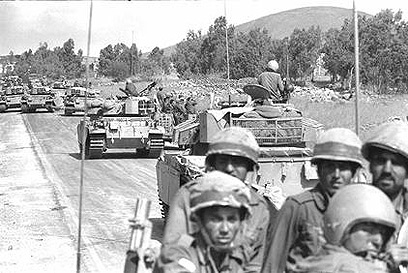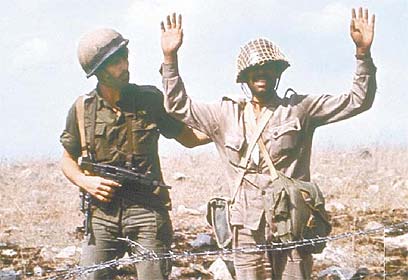
Morning of Yom Kippur War: Cabinet rejects call for preemptive strike
Six hours before war breaks out, Golda convenes cabinet for consultation. IDF chief Dado says preemptive strike would give Israel 'huge advantage and save many lives,' but prime minister and Dayan reject idea: 'It's tempting, but world will portray us as the aggressors.' Minutes of dramatic meeting released
Morning of Yom Kippur War - the fiasco revealed. Six hours before the outbreak of the Yom Kippur War, Prime Minister Golda Meir's cabinet meets with IDF chief of staff David "Dado" Elazar and IDF Intelligence chief Eli Zeira. The minutes of the top secret meeting, released by the State Archives overnight Wednesday, reveal the scope of the fiasco. The army chief informs the ministers of a dramatic message relayed by Egyptian billionaire Ashraf Marwan, who spied for Israel, of the impending war.
Elazar says the communiqué is authentic, but Defense Minister Moshe Dayan still opposes a preemptive strike and a general call up of army reserves ("They'll say we are the aggressors"), the head of IDF Intelligence is overconfident ("They know they will lose") and Golda says, "As for a preemptive strike, the heart is tempted, but we'll see."
During the meeting, which began at 8:05 am on October 6, 1973, Dayan discusses Israel's Arab minority, and calls on the government to sustain a "liberal policy." He also suggests evacuated children from the Golan Heights. Meir says the children should be evacuated "now, and not on the eve of the operation." The IDF chief intervenes: "This is the eve of the operation."
Related articles:
- Yael Dayan: Make all war records public
- Dayan to Golda: If we can't evacuate, we'll leave wounded behind
- Opinion: The lessons of war
Dayan brings up the communiqués between Jordan, Egypt and Syria, but is against "warning the Jordanian king at this time." However, he adds, should Jordan activate its radars, Israel will "take them out."
The possibility of launching a preemptive strike is raised throughout the meeting. Dado says such a strike would give Israel "a huge advantage and save many lives."
"We can wipe out the entire Syrian air force at noon. We need another 30 hours to destroy the missiles. If they plan to attack at 5 pm, the Air Force will operate freely against the Syrian army. This is what we are capable of," says the army chief.
"From an operational standpoint I am very tempted. We don't have to decide now. We still have four hours for dialogue with the Americans. Perhaps by noon the Americans will tell us that an (Arab) attack is certain, and then we may be able to launch the preemtpive strike.

Yom Kippur War (Archive photo: GPO)
Dayan explains why Israel should not launch a preemptive strike, as it did in the Six Day War. "We cannot afford it this time. If the Egyptians attack, we'll be able to attacks the Syrians. Based on the information I have obtained, we cannot launch a preemptive strike. Not even five minutes beforehand. If we'll be in a situation whereby Egypt starts (the war), we'll be able to strike Syria as well. If they don’t open fire, we won't open fire."
IDF chief Elazar says the army reserves must be called up immediately, but Dayan replies, "I believe we can complete the call-up tomorrow. It's not like in 1967. The war will begin in the Suez and Golan Heights. It is important that they don't say we started (the war). Calling all the reserves to duty before one shot has been fired – they'll immediately say we are the aggressors.
"I suggest calling up all of the Air Force reserves, as well as Armored Corps division in the Golan and another in Sinai. This can amount to 50,000-60,000 people. We can complete the limited call-up by this evening and have the forces prepare for action until tomorrow morning. If during the night we want to call up more – we will," says Dayan.

IDF soldier with Syrian POW (Photo: David Rubinger)
Dado says 200,000 soldiers must be called up. "As far as the international-diplomatic impact is concerned, it doesn’t matter if we call up 70,000 or 200,000. Actually, it may have an effect, because the Arabs will understand that they've lost the element of surprise. On the other hand, a call-up incriminates us. They'll say we called up (reserves) to start a war. I prefer that they say we started (the war) and we win. They'll say it anyway."
Golda decides on a gradual call-up, and says that a preemptive strike is "very tempting, but this is not 1967. They (international community) won't believe us."
As the meeting progresses, Golda is more inclined to accept the IDF's suggestion for a broad call-up. "If a war breaks out, we must be in the best possible position. This is my only concern."
Dayan sums up the discussion by saying that the army chief should call up the entire reserve force.
Throughout the meeting, IDF Intelligence chief Zeira says he is still uncertain whether a war will break out. "Despite the fact that they are prepared, I believe that they know they will lose. (Egyptian president Anwar) Sadat is not in a position whereby he has to go to war."
Prime Minister Meir asks whether the current situation is different from the one Israel faced on the eve of the Six Day War. Zeira in response: "(Sadat) has not given the order yet. He may back down at the last minute. We may be able to influence what he does or decides."
- Follow Ynetnews on Facebook










